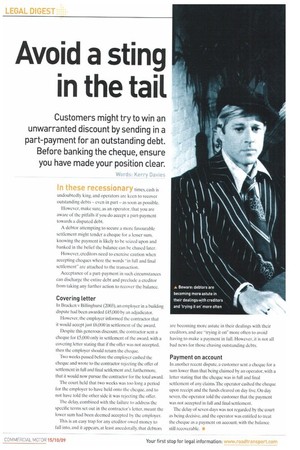Avoid a sting in the tail
Page 26

If you've noticed an error in this article please click here to report it so we can fix it.
Customers might try to win an unwarranted discount by sending in a part-payment for an outstanding debt. Before banking the cheque, ensure you have made your position clear.
Words: Kerry Uavies In these recessionary times, cash is undoubtedly king, and operators are keen to recover outstanding debts — even in part — as soon as possible.
However, make sure, as an operator, that you are aware of the pitfalls if you do accept a part-payment towards a disputed debt.
A debtor attempting to secure a more favourable settlement might tender a cheque for a lesser sum, knowing the payment is likely to be seized upon and banked in the belief the balance can be chased later.
However, creditors need to exercise caution when accepting cheques where the words "in full and final settlement" are attached to the transaction.
Acceptance of a part-payment in such circumstances can discharge the entire debt and preclude a creditor from taking any further action to recover the balance.
Covering letter In Bracken v Billinghurst (2003), an employer in a building dispute had been awarded £45,000 by an adjudicator.
However, the employer informed the contractor that it would accept just £6,000 in settlement of the award.
Despite this generous discount, the contractor sent a cheque for £5,000 only in settlement of the award, with a covering letter stating that if the offer was not accepted, then the employer should return the cheque.
Two weeks passed before the employer cashed the cheque and wrote to the contractor rejecting the offer of settlement in full and final settlement and, furthermore, that it would now pursue the contractor for the total award.
The court held that two weeks was too long a period for the employer to have held onto the cheque, and to not have told the other side it was rejecting the offer.
The delay, combined with the failure to address the specific terms set out in the contractor's letter, meant the lower sum had been deemed accepted by the employer.
This is an easy trap for any creditor owed money to fall into, and it appears, at least anecdotally, that debtors are becoming more astute in their dealings with their creditors, and are "trying it on" more often to avoid having to make a payment in full. However, it is not all bad news for those chasing outstanding debts.
Payment on account
In another recent dispute, a customer sent a cheque for a sum lower than that being claimed by an operator, with a letter stating that the cheque was in full and final settlement of any claims. The operator cashed the cheque upon receipt and the funds cleared on day five. On day seven, the operator told the customer that the payment was not accepted in full and final settlement.
The delay of seven days was not regarded by the court as being decisive, and the operator was entitled to treat the cheque as a payment on account, with the balance still recoverable. •












































































































































